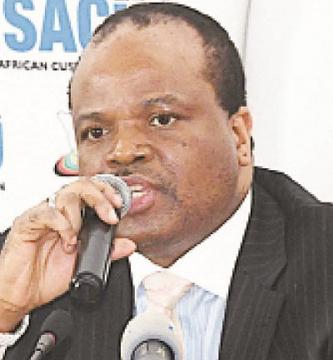COME, LEARN ABOUT SD BEFORE CRITICISING - KING
 His Majesty King Mswati III.
His Majesty King Mswati III.
MBABANE – It only makes sense to give yourself time and learn more about something before criticising it. This is the message that His Majesty King Mswati III has sent to the critics who spoke badly about the country when it took over the SADC Chairmanship from Botswana last year.
His Majesty, who was interviewed by the SABC at the Lozitha Palace, was quoted saying that he felt pity for those who criticised the country when they had not had the chance of experiencing its system and traditions.
The interview was conducted by SABC’s Mweli Masilela, where His Majesty reflected on his year-long term as SADC chairperson and pointed to progress in trade and regional economic growth.
Part of it was aired on the SABC news bulletin, with the King mentioning that the country had gone through many critical processes including that of formulating the Constitution, where he said every Swazi participated.
“With the Constitution, it is clear that we used a democratic process which clearly defines the structure of our kingdom. I wish those critics could come to Swaziland because once you come here, you will learn about the process in terms of the structuring of the country. The process is people driven and is not in any way a one-man show,” he said.
He invited the critics to give themselves time, experience and learn more about the Monarchy and the kingdom. The King further spoke of the importance of dialogue instead of using violence to solve issues, and gave assurance that the region was on track in as far as peace and stability was concerned.
“Obviously there are still problems here and there but they are manageable. The best solution is to always sit down and talk and that is what we encourage,” he said.
When His Majesty took over the chairmanship from Botswana President Ian Khama in August last year, the country came under sharp criticism from local and foreign civil society organisations on an array of political issues. From the local side, organisations like the Communist Party of Swaziland mentioned that they were astonished that the governments of southern Africa had shown massive disregard for the plight of the Swazi people in as far as democracy is concerned. During the SADC People’s Summit held at Bosco Skills Centre last year, which was hosted by the Southern African People’s Solidarity Network (SAPSN), about 53 demands on the region were deliberated, where Swaziland was listed among the five countries that needed to be dealt with urgently.
The demand was that the kingdom needed to be democratised by unbanning political parties and that there was a need for SADC to ensure the respect for the rule of law and human rights. During their deliberations, representatives of organisations from SADC countries said the current state of affairs in southern Africa within the political, economical, social, cultural and environmental arenas, showed that the region was progressively being affected by capitalism, neo-colonialism and patriarchy.
They said the region was faced by ongoing and deepening multi-crisis as a consequence of neoliberal economic policies.




 del.icio.us
del.icio.us Digg
Digg
Comments (0 posted):